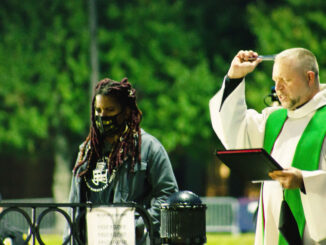
By Brittney Jackson | The Duquesne Duke
A proposed policy by the Pennsylvania State System of Higher Education could ban guns in “sensitive areas” on the campuses of 14 publicly owned universities in the state.
In fall 2013, the Public Safety and Security Task Force assembled by the state system drafted a policy that would prohibit guns in public university buildings, outdoor classes and events. However, guns would generally be allowed in areas such as parked cars and outdoor areas if people had the proper concealed weapon carrying permits.
Kenn Marshall, a state system spokesman, said seven of the 14 universities already adopted a policy similar to the proposed ban before the task force was given the additional responsibility of considering a potential weapons management policy. If the ban is enacted, only the remaining seven universities will need to modify their existing weapons policies.
Thomas Hart, Duquesne public safety director, said the Duquesne has a blanket ban on weapons. University police offers are the only exceptions to the ban. Hart said that any student found concealing a weapon on campus could potentially face criminal charges, administrative charges or expulsion.
According to Marshall, the task force was created in April 2013. The task force’s primary responsibility is to examine the operations of police and security on public campus.
The state system includes the following universities in Pennsylvania: Bloomsburg, California, Cheyney, Clarion, East Stroudsburg, Edinboro, Indiana, Kutztown, Lock Haven, Mansfield, Millersville, Shippensburg, Slippery Rock and West Chester.
Marshall said the task force was asked to look at a potential weapons policy because of Castle Doctrine legislation. Adopted three years ago, the Castle Doctrine allows people to use deadly force if approached by someone with a weapon in their house or public places.
The proposed policy, which would prohibit guns in “sensitive” areas on campus, any areas where a large amount of people gather, is very similar to a policy developed by George Mason University in Virginia, Marshall said.
Shira Goodman, executive director of CeaseFirePA, advocates upholding gun bans on campuses. Goodman feels that PASSHE is taking away individual schools’ rights to a blanket ban on guns, not just in “sensitive” areas. She also said she believes that permitting people to carry guns on campuses with parked cars and open spaces could introduce many new dangers, such as combining weapon carrying with alcohol or drug use.
“We’ve encouraged PASSHE to look at what’s worked for these campuses,” Goodman said. “Guns don’t make campuses safer.”
According to Armed Campuses, only 13 states have blanket bans on weapons at public universities. The remaining states either allow weapons on campus, allow guns but restrict the locations and people who are permitted to carry guns, allow each individual schools to decide their own weapons policy or allow guns in locked cars in parking lots.
Goodman also said she believes the proposed gun policy might be a solution to avoiding potential lawsuits. Since students and faculty have the right to be on public university property, people could say they have the right to defend themselves with a weapon if they are approached by an attacker or intruder with a weapon.
Goodman does not agree with this reasoning and believes that campuses should be allowed to keep their gun bans, and if lawsuits do arise, the justice system should be responsible for making decisions and solutions.
Gun Owners of America spokesman Eddie Isler said students have the right to carry weapons. He said he supports that the ban will permit students to carry guns in parked cars and outdoor areas, although he would rather see students with proper carrying permits be allowed to carry guns wherever they want.
Isler also said he feels this ban could be an important expansion of freedom for any of the universities that have a blanket weapons ban. He said he thinks the proposed ban could give students with proper carrying permits the chance to feel safer in situations such as walking through empty parking garages at night.
Isler said that less than 1 percent of people with proper carrying permits use their weapons for illegal activities. He also said that people who go through the process of obtaining a concealed carrying permit value and want to protect their right to carry guns.
Marshall said nothing is finalized and that more time is needed to review the proposed weapons management policy. There is currently no date set for voting on the proposed ban.





“Hart said that any student found concealing a weapon on campus could potentially face criminal charges, administrative charges or expulsion.”
Criminal charges? What law was broken?